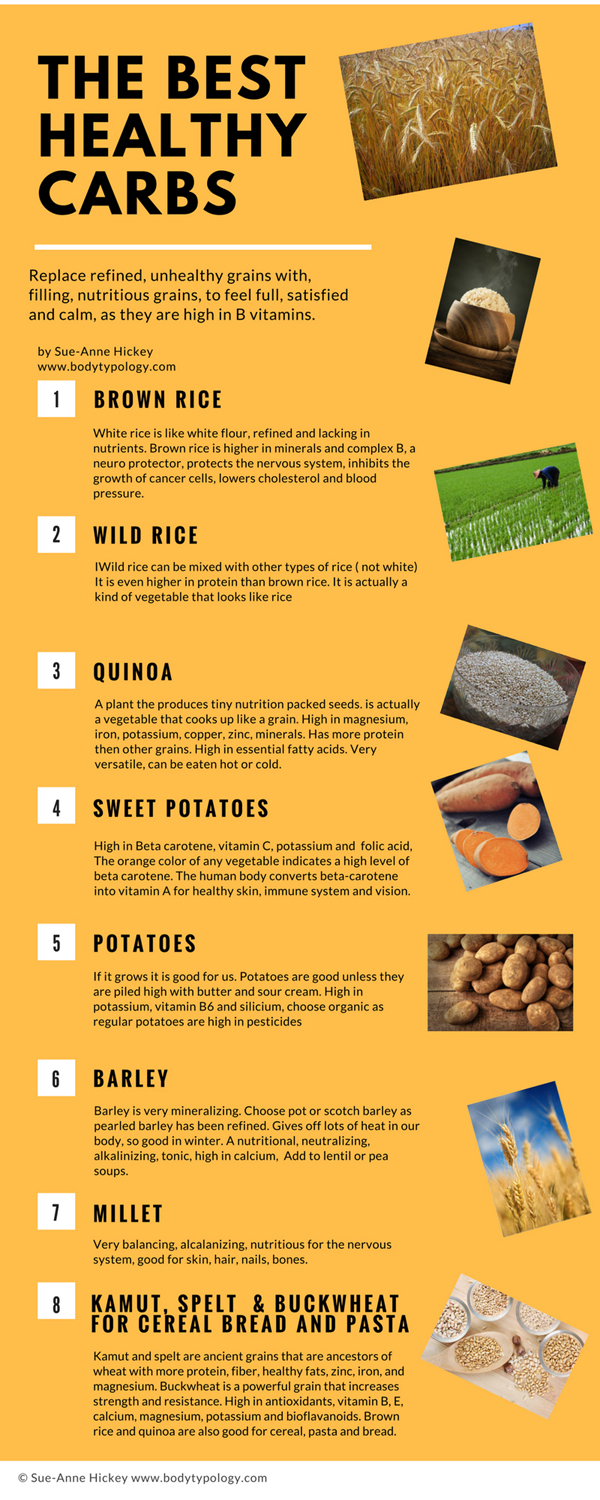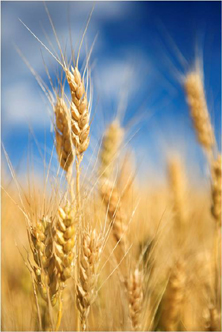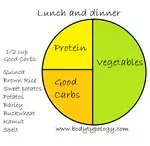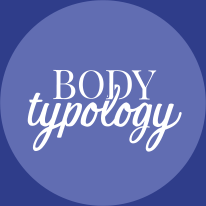Whole Grain List -
Benefits of Whole Grains

Your healthy whole grain list includes a lot of nutritious grains you can easily incorporate into a healthy diet plan. I truly believe that one of the biggest mistakes people make when trying to find natural ways to lose weight, or follow healthy eating guidelines, is to avoid eating grains.
Grains are good for us! It is all about choosing healthy whole grains instead of refined grains. Having them as part of a healthy diet, not as the main food that we eat.
Whole grains are high in fiber, low in calories, rich in minerals and vitamins, especially B vitamins. B vitamins nourish the nervous system so they're very calming, perfect to help you handle stress! Grains are also high in vitamin E, the anti aging vitamin with antioxidants. Grains fill you up so you are not hungry for unhealthy snacks.
There are 3 unhealthy grains or grain products to avoid:
- White flour
- White rice and
- Whole wheat
I'll explain why in more detail below.
Your healthy whole grain list:

- Brown Rice
- Quinoa
- Buckwheat
- Spelt
- Kamut
- Wild rice
- Barley
- Oats
- Rye
- Millet
- Corn (organic)
- Amamranth
- Teff
- Farro
- Triticale
Refined grains or flour
Refined white flours are not on the list. When wheat flour is refined, the bran and the germ is removed.
This is what is lost in Refining:
- 80% of thiamine lost, vitamin B1
- 60 % vitamin B2
- 75% of vitamin B3
- Minerals
- 80% of iron
- Magnesium 76%
- Fatty acids, 50%, but the fat that is left is not good as white flour never goes bad or rancid
It is said that about one third of the food in North America is made with white flour.
Bread, buns, donuts, crackers, cookies, cakes, bagels, cereal, pizza dough, sauces, and the list goes on. Wheat starts out with 10 to 15 vitamins, about 75% are removed and then with "Enriched flour" about 3 are added back in.
15 to 20 minerals are removed from refined flour. Up to 98% are lost and only iron is added back in.
During the chemical whitening process the flour is bleached with chemicals.
The main thing that happens when you eat anything made with white flour is that you never feel full. You are eating empty calories. The fat has been removed, the minerals, the vitamins and the fiber. There is nothing nutritious left in it. So you still feel hungry and you end up eating even more junk food.
White sugar and white flour are empty calories. They can keep forever without going bad, perfect for packaged foods.
The results of a diet with refined flours?
- Constipation
- Joint pain
- Hypoglycemia
- Diabetes
- Over weight
- Inflammation
- High Acidity
A body that is overly acidic is one that is devoid of minerals and prone to osteoporosis, disease and cancer.
* Did you know that many fast food chains are selling bread, often called "brown bread," but it is really white bread that has been darkened with a little molasses?
Whole wheat:
The challenge with wheat lies in that it has been hybridized, transformed and often, genetically modified in order to produce bigger plants that yield bigger results. It is no longer the healthy grain that it once was.
When you buy bread or crackers, etc., it may say "whole wheat" on the package, but that does not mean that all of the grain is being used.
Better than whole wheat is "Whole Grain."
The benefits of whole grains are that they still contain all the beneficial parts of the grain. The germ, the bran, the fiber and all the minerals and vitamins.
Pasta made with whole grain is much better for you than white pasta.
Better than whole grain are Spelt and Kamut.
These, along with brown rice are some of your best choices for cereal, pasta or bread.
What is spelt ?
Spelt is wild wheat. It is an ancient ancestor of wheat that has been around much longer than wheat. It is 9,000 years old. Spelt contains
- More fiber
- More protein
- More healthy fats
- More soluble and insoluble fiber
Kamut:
Kamut is an ancestor of durum wheat and it was discovered in Egypt 5000 years ago. Kamut has 20 to 30% more protein than wheat, more magnesium, zinc and iron.
It contains less gluten than spelt so it is lighter for baking.
White rice, similar to brown rice, has been refined so that all of the goodness has been removed. It is not healthy and few people understand this. White rice is one of the 4 white foods that should be avoided and replaced with brown rice in your diet.
- White flour
- White sugar
- White rice
- White pasta
They are all nutritionally void, spike the glycemic levels way up and are acidifying to the body.
As a Naturopath, many of my clients ask me, "what about basmati white rice"? It is not part of our healthy whole grain list. It is still refined white rice. Basmati, is simply the flavor or odor goes of the rice. Eat brown basmati rice.
Buckwheat grows without the need for fertilizer. When planted, it takes all of the nutrients out of the soil.
It is rich in bioflavonoids and antioxidants. It is a tonic for veins and capillaries and it is excellent for varicose veins.
It is high in B vitamins, vitamin E, magnesium, calcium and potassium.
Corn
Corn of course has been genetically modified so it is best to only eat organic corn. Popcorn, and anything made with corn or corn flour should be organic.
Barley is high in minerals. There are 2 kinds of barley, pearled barley which has been polished. Similar to refining the bran and germ has been removed. Pot barley or scotch barley is much better as it has not been polished so all the nutrients are still intact.
Quinoa is actually a seed but cooks up like a grain, so I have added it to our whole grain list. It deserves it's own complete page as it is one of the best, nutritious, most versatile, fast and easy to cook grains available.
Enjoy your whole grains in moderation with every meal. Fill half to two thirds of your plate with vegetables, the other half or one third with good quality protein and good quality whole grains.

Hi! I'm Sue-Anne! I'm a creator of Bodytypology and I have written every page on this website, I hope you're enjoying the information.
If you're struggling with knowing what's healthy to eat and what to avoid for your specific body type, or want to drop a few pounds, I'd love to help you, let's chat!
Check out these related pages!
Reference:
Sass, Lorna, Whole Grains, Every Day, Every Way (New York, Random House, Inc., 2006) 5-11



